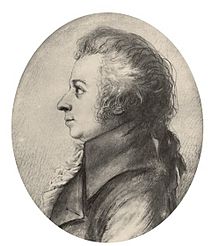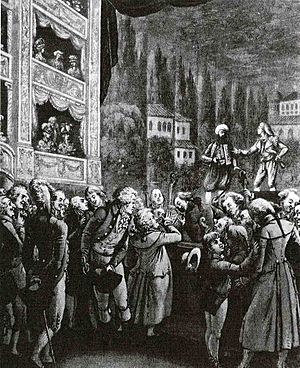Die Entführung aus dem Serail facts for kids
Quick facts for kids Die Entführung aus dem Serail |
|
|---|---|
| by Wolfgang Amadeus Mozart | |

Portrait by Doris Stock, 1789
|
|
| Genre | Singspiel in 3 acts |
| Translation | The Abduction from the Serail |
| Librettist | Christoph Friedrich Bretzner |
| Language | German |
| Premiere | Nationalsingspiel, Vienna 16 July 1782 |
Die Entführung aus dem Serail (which means The Abduction from the Seraglio in English) is a famous opera by Wolfgang Amadeus Mozart. It's a special kind of German opera called a Singspiel. A Singspiel mixes singing with spoken parts, like a musical play. Mozart's other well-known opera, The Magic Flute, is also a Singspiel.
The story for the opera, called the libretto, was written in German by Christoph Friedrich Bretzner. It was later changed a little by Gottlieb Stephanie. The opera tells the exciting story of a hero named Belmonte. He tries to rescue his true love, Konstanze, from a palace (called a seraglio) belonging to Pasha Selim. Belmonte gets help from his loyal servant, Pedrillo, to complete this daring mission.
This opera was first performed by a group called the Nationalsingspiel. This group was supported by the Austrian emperor, Joseph II. Mozart had moved to Vienna in 1781 and was looking for a chance to write an opera. He showed one of his earlier works, Zaide, to the manager of the Nationalsingspiel. The manager was very impressed and asked Mozart to write a new opera for the company.
The opera is meant to be lighthearted and funny. Some of the characters in the story are Turkish. At that time, stories and music from Turkey were very popular in Europe. Mozart included some "Turkish" sounding music in this opera. This was his way of showing what Europeans thought Turkish music sounded like. Some of the songs, called arias, are very hard to sing. One famous example is "Martern aller Arten" ("Tortures of all kinds"), sung by Konstanze. It's so long and complex that it's almost like a concerto for a singer.
Die Entführung aus dem Serail was a huge hit when it first came out. It earned Mozart a good amount of money. However, he didn't always get paid fairly for later performances. This meant he didn't become super rich from it.
A famous story says that Emperor Joseph II told Mozart after hearing the opera, "There are too many notes!" Mozart cleverly replied, "There are just as many notes as there should be."
Characters in the Opera
| Role | Voice type | First Performance, 16 July 1782 Conductor: W. A. Mozart |
|---|---|---|
| Belmonte, a Spanish nobleman | tenor | Valentin Adamberger |
| Konstanze, Belmonte's girlfriend | soprano | Caterina Cavalieri |
| Blonde, Konstanze's English maid | soprano | Therese Teyber |
| Pedrillo, Belmonte's servant | tenor | Johann Ernst Dauer |
| Osmin, the Pasha's chief guard | bass | Ludwig Fischer |
| Bassa Selim, the Pasha | spoken role | Dominik Jautz |
| Klaas | spoken role | Unknown |
| Chorus of Janissaries | ||
Instruments Used
The singers in the opera perform with a Classical orchestra. To make the "Turkish" music, Mozart added special instruments. These include the bass drum, cymbals, triangle, and piccolo.
The main orchestra has pairs of flutes, oboes, clarinets, and bassoons. It also includes horns, trumpets, and two timpani (kettledrums). Of course, there are also many strings like violins and cellos. In one particular song, "Sorrow has become my lot," a basset horn is also used.
Images for kids
-
Costume study for Blonde, around 1830–50, by Christof Fries, Metropolitan Museum of Art
-
An illustration of the women's quarters in a seraglio, by John Frederick Lewis, 1873
See also
 In Spanish: El rapto en el serrallo para niños
In Spanish: El rapto en el serrallo para niños
 | William L. Dawson |
 | W. E. B. Du Bois |
 | Harry Belafonte |





